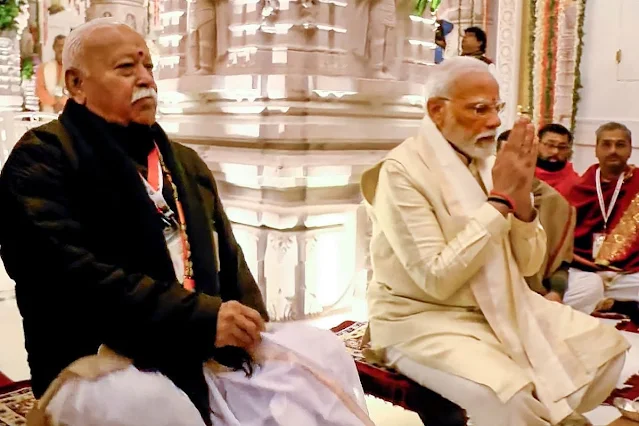The outcomes of the 2024 Parliamentary Elections proved disheartening for the BJP, as its Lok Sabha strength dwindled from 303 to 240 seats. Consequently, the NDA, which had maintained a dominant position for the past decade, now faces the prospect of its alliance partners having more influence. This shift may curtail the BJP’s assertive Hindu nationalist agenda.
Furthermore, the strengthening of the INDIA coalition and growing support for Rahul Gandhi has enabled the opposition to adopt a more assertive stance. It appears that the RSS refrained from actively supporting its political offshoot, the BJP, during these elections.
This doesn’t suggest a desire for BJP’s defeat, but rather a subtle admonition aimed at tempering the rise of the so-called ‘non-biological’ individuals within the party.
Even so, the RSS remains a significant force, engaging in post-election discussions with BJP leadership to evaluate the results and strategize for the future.
In Uttar Pradesh, a delegation from the RSS, headed by joint general secretary Arun Kumar—who has been pivotal in fostering coordination between the two organizations—has begun to address the implications of the election results. Meanwhile, Ram Madhav of the RSS has assumed responsibility for handling elections in Jammu and Kashmir.
At a more fundamental level, the RSS acknowledges that the BJP’s electoral decline can largely be attributed to a shift in Dalit votes towards the INDIA coalition.
In response, the VHP is being mobilized to engage with Dalit communities through a series of meetings and religious initiatives. VHP saints and Sadhus will undertake foot marches, conduct spiritual gatherings, and even visit homes in Dalit settlements to strengthen these ties. According to reports, these efforts will span 9,000 subdivisions overseen by the VHP.
This approach evokes memories of the Ram Temple movement, where the VHP played a crucial role before the BJP took the lead. The RSS not only prepares its grassroots workers but also exercises considerable influence from the sidelines.
The 2024 election results have prompted a renewed drive from the RSS to recuperate their shifting voter base. This situation raises questions about RSS’s claim of being a cultural entity, as their political aspirations are evidently at stake.
The strong emphasis on the Ram Temple movement was, in part, a reaction to the Mandal Commission’s recommendations. After ten years of Modi’s governance and significant advances in the Hindutva agenda, it is becoming increasingly clear that the RSS, which espouses principles rooted in ‘Manu Smriti’ and anti-Muslim politics, is at odds with the notion of social justice.
Opposition parties, after a lengthy period of disillusionment with the Hindu Rashtra politics, are beginning to understand the landscape shaped by a decade of authoritarian governance. The journey to awaken to the true nature of the RSS has been protracted, with Nehru’s earlier warnings about the organization’s fascistic tendencies largely overlooked by successive governments.
The RSS's infiltration into significant social and political spheres has only compounded these issues. The last two terms of BJP rule have left many citizens and political entities disenchanted, validating Nehru’s critiques of the RSS as an organization that mirrors Nazi ideology.
It is becoming increasingly clear that RSS, which espouses principles rooted in Manu Smriti, is at odds with the notion of social justice
Recent awakening among civil society groups, previously uninvolved in electoral matters, indicates a collective acknowledgment of the damage wrought by the BJP-RSS alliance. Regardless of the INDIA coalition's faults, these groups are prioritizing the need for a political environment that upholds democracy and pluralism. Initiatives such as Eddulu Karnataka and the Bharat Jodo Abhiyan have catalyzed collaboration among diverse civil society movements, aiming to protect democratic values.
This awakening transcends politics, reflecting concerns over the erosion of scientific rationalism in favor of blind faith. The glorification of mythic pasts and the promotion of pseudoscience, such as ancient Indian practices, undermine rational thinking.
Institutions like IITs have even begun engaging in projects to validate the effectiveness of Panchgavya—a concoction of cow dung, urine, and other products. Moreover, RSS-trained propagandists are prevalent across media platforms, embedding regressive ideologies into national discourse.
The BJP's electoral defeat is merely a first step in addressing these deeper societal ailments. The onus now lies in fostering a collective consciousness anchored in the values that defined India’s freedom movement, confronting the corrosive impact of communal ideologies across historical, scientific, and legal domains.
---
*Political commentator


Comments